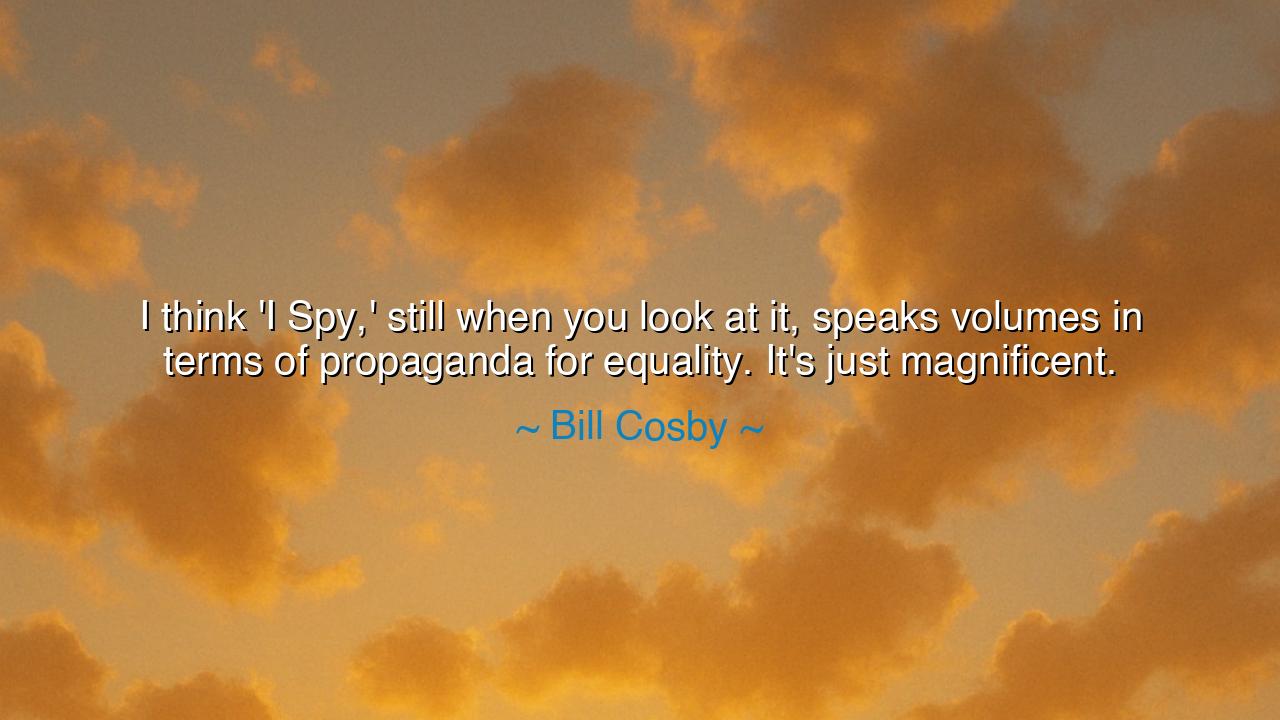
I think 'I Spy,' still when you look at it, speaks volumes in
I think 'I Spy,' still when you look at it, speaks volumes in terms of propaganda for equality. It's just magnificent.






In the days when television held the power to shape the minds of millions, there emerged a show unlike any other—“I Spy.” It was not merely entertainment; it was a mirror of the world’s deep yearning for equality, a subtle yet powerful declaration that two men—one Black, one white—could stand side by side as equals, brothers in purpose, united in courage. When Bill Cosby spoke the words, “I think ‘I Spy,’ still when you look at it, speaks volumes in terms of propaganda for equality,” he was not praising mere dialogue or performance. He was speaking of a symbol, a quiet revolution disguised in the laughter and tension of a spy drama. For in that era, when color divided nations and fear governed hearts, to simply stand as equals on the screen was to shout to the heavens that humanity cannot be measured by skin.
Before “I Spy,” the presence of a Black man in a leading television role was almost unthinkable. The stage was set for caricature and subservience, not for dignity or heroism. Yet Cosby’s role as Alexander Scott, a sharp, educated, composed agent, challenged that narrative. He did not fight for equality with weapons, but with presence. His calm intelligence, his partnership with Robert Culp’s character, his humanity—these were the weapons that fought ignorance more powerfully than fists or fire. It was a battle of perception, and every episode was a victory for the soul of a people long misrepresented.
When Cosby called it “propaganda for equality,” he revealed the artful cunning of change. Propaganda, often used to manipulate, here became a tool of liberation. For when the world sees a Black man as equal, as capable, as worthy of respect, the chains of prejudice begin to loosen in the mind before they are broken in law. This was not the loud revolution of streets and slogans—it was the whispering revolution of the screen, seeping gently into the living rooms of those who did not yet know their hearts could change.
Consider how this mirrors the story of Jackie Robinson, who broke the color barrier in baseball. He did not stand upon the field to preach, yet every time he took a base, every time he endured insult with silent strength, he was teaching America the same lesson: that equality does not beg—it proves itself through excellence. So too did Cosby in “I Spy.” He showed that equality does not need to demand belief; it needs only to be lived, authentically, unapologetically, until the world grows used to justice as its natural order.
The ancients would have called such acts a form of heroism without sword—the courage to reshape reality not through force, but through image, influence, and example. And truly, it was heroic. In a time when one’s race could dictate one’s worth, to appear on screen as a man of intellect and grace was to rewrite destiny itself. The power of representation, like the quiet flow of a river, changes the landscape slowly, but forever. The walls of prejudice do not fall with one blow; they erode, stone by stone, through the persistent truth of humanity revealed.
Let the young remember this: art can be a weapon, but a righteous one. Not all wars are fought with blood; some are fought in the minds of men. The equality that “I Spy” preached was not bound to scripts or studios—it was a vision of humanity unchained, carried forward by courage and creativity. Those who create, who paint, who act, who write, must know that they, too, can shape civilizations by what they choose to show the world.
And thus, the lesson endures: to change hearts, one must dare to be seen differently. If your time calls you to stand in the light of misunderstanding, do not shrink from it. For every act of dignity, every portrayal of truth, every story told in the language of compassion, becomes propaganda for equality in its purest form—a declaration that we are, all of us, divine in worth. Walk proudly, create boldly, and let your existence itself be a message that the world cannot forget.






AAdministratorAdministrator
Welcome, honored guests. Please leave a comment, we will respond soon